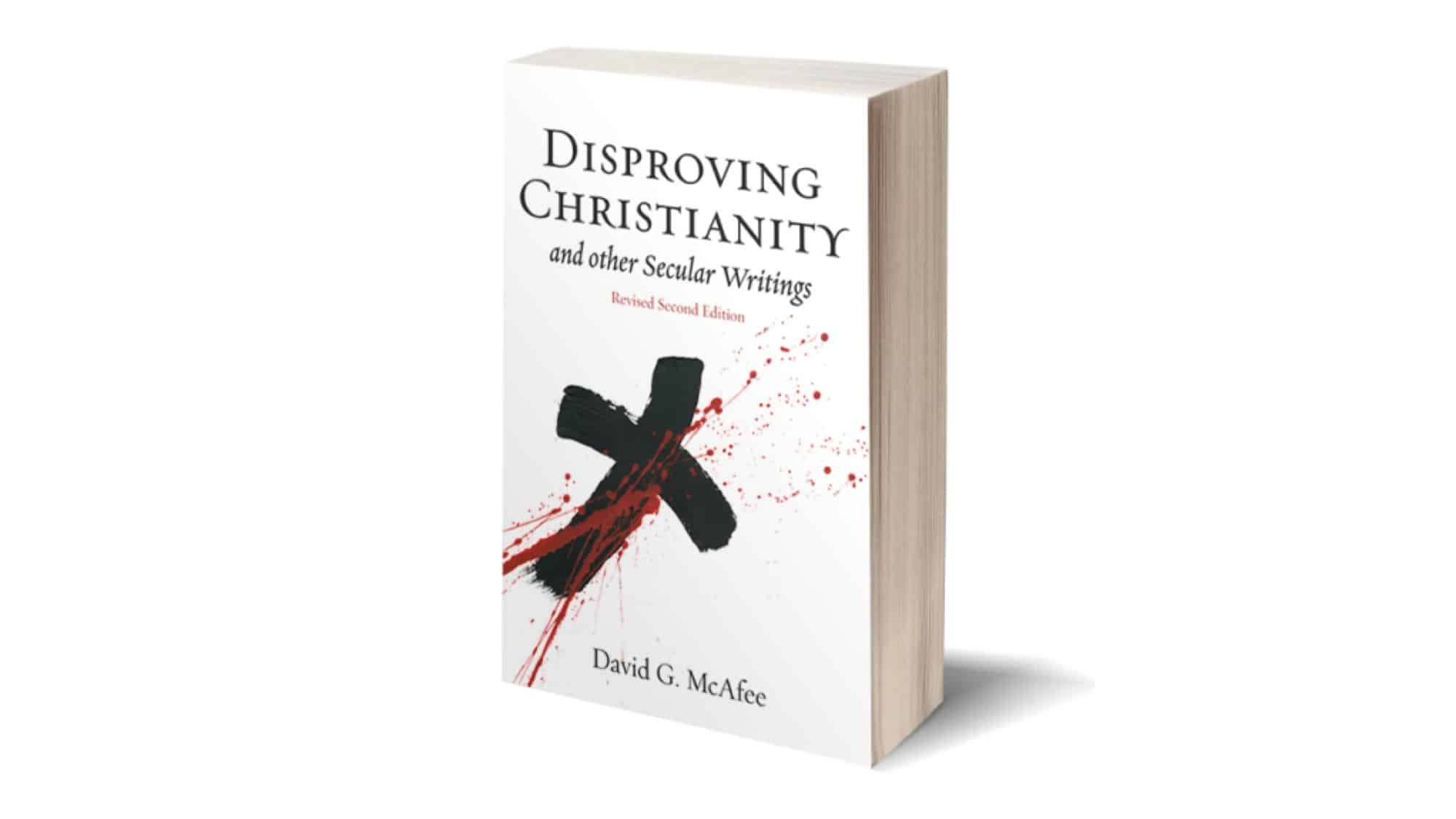Disproving Christianity and Other Secular Writings. By David G. McAfee. 2nd ed. Great Britain, UK: Dangerous Little Books, 2011, 1 + 139 pp., $13.99.
Review
Disproving Christianity and Other Secular Writings seeks to expose the “fallacies, improbabilities, and contradictions created by the Christian tradition” (para. 1), promising to establish such contentions with biblical evidence (para. 2). After exhibiting these contentions, McAfee purposes to establish the conclusion “that the words of The Holy Bible, and therefore the teaching of the Christian community, cannot be a representation of an omnipotent Creator” (p. 109). Accordingly, this critique will examine these assertions, demonstrating that although McAfee presents a fervent rant against the Christian community, he fails to substantiate his primary allegations, thereby proving unable to displace Christianity as a viable worldview.
Dividing the publication into two distinct sections, McAfee ambitiously determinations to disprove Christianity in part one, before providing six miscellaneous secular essays in part two. Since the second section does not directly pertain to McAfee’s allegations, it will receive omission from further consideration. Building his case, McAfee offers seven lines of argumentation (each serving as an individual chapter):
1) Cultural Christianity (pp. 1-6)
2) Christianity in America (pp. 7-20)
3) Morality versus Worship (pp. 21-26)
4) Mainstream Theories of Disapproval (pp. 27-42)
5) Contradictions in Scripture and in Practices (pp. 43-64)
6) Minor Contradictions (pp. 65-82)
7) Atrocities and Absurdities Committed or Condoned by the Lord (pp. 83-108)
Cursory examination of the publication’s contents reveals the impotence of McAfee’s argument, as chapters one, two, and (most of) five appear to commit the red herring fallacy, proving irrelevant for disproving the truthfulness of Christianity or establishing fallacies, improbabilities, and contradictions of fundamental biblical doctrines.
For example, beginning his discourse, McAfee addresses cultural Christians—those labeling themselves Christian due to cultural tradition rather than personal belief in the truthfulness of Christian propositions. He writes, “In America, most people identify with the Christian religion. . . Yet, I am not convinced that those ‘adherents’ a) know what it means to be a Christian. . . and b) actually follow the biblical teachings associated with the religion” (p. 1). Regrettably, most Christian theologians and apologists would probably agree with this statement, actively experiencing frustration with this aspect of American culture, while attempting to educate people on fundamental aspects of Christianity. In fact, recent sociological studies indicate only 17 percent of practicing Christians—those who consider their faith important and attend church regularly—maintain a biblical worldview.1 Nevertheless, the pervasiveness of cultural Christianity does nothing to disprove the objective propositions of Christianity, nor does it demonstrate logical inconsistencies within biblical doctrine, it merely highlights a notable deficiency within the community. Additionally, by recognizing the abysmal representation of orthodoxy within the overarching Christian community, McAfee renders his following contentions meaningless, as he seeks to underscore inconsistencies between Christians’ beliefs and practices in comparison to biblical teachings (p. 18; 43-45). Unquestionably, if a person does not possess a biblical worldview, no one should expect his beliefs and behavior to be consistent with biblical teachings. Therefore, McAfee merely reiterates the point that not all professing Christians understand and adhere to the teachings of Jesus, which does nothing to further his case against Christianity itself.2
Similarly, McAfee’s erroneous logic extends to his list of biblical contradictions. Beginning his chapter on textual contradictions, he writes, “Some of these are well-known, some are largely ignored, but all show that The Bible is false in one way or another, even if just one of the following is irreconcilable among the believers” (p. 65). Firstly, McAfee’s objections stem from a literal reading of the text (para. 3; 4; p. 65; 82; 110), revealing his adamant refusal to employ sound hermeneutical methodologies or even attempt to identify and understand the context. Although McAfee insists the Bible unequivocally mandates a literal interpretation (p. 110), contemporary theologians, biblical scholars, and textual critics would disagree.3 After all, even the most biblically illiterate person can understand that when Jesus says, “I am the door,” (John 10:9), He is making a metaphorical statement, rather than a literal one.4 Admittedly, not every passage will be this overt in its usage of emblematic verbiage, but this is why identification and consideration of the context remains a preliminary consideration for proper Bible interpretation.5
Secondly, biblical scholars remain confident there exist satisfactory solutions to all textual difficulties, and numerous volumes elucidating each.6 Nonetheless, McAfee never contemplates any of these possible solutions and refuses to address any counter-arguments which oppose his interpretation.7 Finally, McAfee’s “minor contradictions,” do not significantly challenge the stability of core Christian doctrines. For example, McAfee notes a prophetic disconnect as the Messiah is anticipated to receive the name “Emmanuel” (cf. Isaiah 7:14; Matthew 1:23), yet is given the name “Jesus” (p. 70). Even if such contradictions were to prove irreconcilable, they would not disprove Christianity, nor would they demonstrate a logical fallacy, improbability, or fundamental contradiction of Christian dogma. At most, such biblical contradictions would undermine the doctrine of biblical infallibility, while leaving the essential doctrines of Monotheism, Trinitarian theology, the hypostatic union, vicarious satisfaction and salvation by grace, and the bodily Resurrection of Christ, firmly intact.8 Consequently, McAfee severely exaggerates his case, while simultaneously exhibiting his intellectual dishonesty by failing to consider scholarly consensuses and relevant counter-arguments to his assertions.
Disappointingly, McAfee’s intellectual dishonesty continues as he actively commits the straw man fallacy, often misrepresenting the Christian worldview.9 For example, McAfee claims, “faith is considered an acceptable substitute for logic and reason in the Christian tradition” (para. 4). Although some Christians elect to embrace a blind faith, the Scriptures do not necessitate nor encourage such endeavors. Instead, the Bible encourages critical thinking, exhorting believers to verify truth-claims, while offering a rational defense of Christian doctrines (cf. Proverbs 3:13; 1 Peter 3:15; Jude 1:3; Acts 17:10-15; 1 John 4:1; 2 Peter 2:12-16; Isiah 1:18; Luke 14:25-33). Furthermore, McAfee supposes nonbelievers receive punishment based solely on their unbelief (p. 24), failing to recognize the moral depravity of humanity in comparison to a holy and righteous God.10 In contrast, the Scriptures acknowledge personal accountability for immoral behavior (cf. 2 Corinthians 5:10; Romans 2:6-11; Jeremiah 17:10; 32:19; Revelation 20:12; 22:12), recognizing that every person fails to achieve God’s moral standard (cf. Ecclesiastes 7:20; Romans 3:12; 3:23), yet He graciously offers redemption through the sacrificial atonement of Jesus (cf. Romans 3:23-24; Ephesians 1:7; 2:8-9; Colossians 1:14; Hebrews 9:12; 1 Corinthians 1:30; John 3:16-18).11 Consequently, it seems many of McAfee’s objections receive annulment by simply articulating Christian doctrines accurately.
Perhaps the best disputation McAfee offers is an antiquated philosophical argument from evil (p. 29), attempting to exhibit a logical contradiction between Christian theism and the presence of suffering. However, Christian philosophers (such as Alvin Plantinga) have done significant work in this area, demonstrating the rational coherence of an omnipotent God and the existence of evil, while Christian theologians and apologists have suggested viable reasons for God allowing evil to (temporarily) persist.12 Accordingly, the logical argument from evil has been abandoned by credible opponents, with renowned atheist philosopher J. L. Mackie concluding, “Since this [free will] defense is formally [i.e., logically] possible, and its principles involves no real abandonment of our ordinary view of the opposition between good and evil, we can concede that the problem of evil does not, after all, show that the central doctrines of theism are logically inconsistent with one another.”13
In conclusion, Disproving Christianity and Other Secular Writings is fraught with fallacious contentions, unsubstantiated assertions, and scholastic oversights, and McAfee fails to support his thesis, proving unable to expose fallacies, improbabilities, and contradictions within the Christian tradition. Moreover, McAfee demonstrates intellectual dishonesty on multiple occasions, neglecting to represent the Christian worldview accurately, while simultaneously refusing to consider alternative interpretations or counter-arguments of credible scholars, theologians, and apologists. Therefore, McAfee’s publication does not displace Christianity as a viable worldview, nor does it further theological or philosophical debate between atheists and Christians, and ought to be disregarded by scholars and laypersons alike.14
- “Competing Worldviews Influence Today’s Christians,” Barna Group, May 09, 2017, https://www.barna.com/research/competing-worldviews-influence-todays-christians/.
- While McAfee's observation does nothing to disprove the objective truthfulness of Christianity, it underscores the point that professing Christians can discredit their personal testimony and dissuade others from investigating the faith as a result of their ungodly and hypocritical behavior. Therefore, as disciples of Christ, we must seek to obtain a biblical worldview (orthodoxy), while simultaneously applying biblical principles to our everyday lives (orthopraxy), remembering that as ambassadors of Christ (cf. 2 Corinthians 5:11-21) our lives present Jesus to a lost word. The only question is, how good (or how accurate) is our presentation?
- William W. Klein, Craig L. Blomberg, and Robert L. Hubbard Jr., Introduction to Biblical Interpretation, Third Edition (Grand Rapids, MI: Zondervan, 2017); Walter C. Kaiser Jr. and Moisés Silva, eds., Introduction to Biblical Hermeneutics: The Search for Meaning (Grand Rapids, MI: Zondervan, 2007); D. A. Carson, and John D. Woodbridge, eds. Hermeneutics, Authority, and Canon (Eugene, OR: Wipf & Stock, 2005); Gordon D. Fee and Douglas Stuart, How to Read the Bible for All Its Worth, Fourth Edition (Grand Rapids, MI: Zondervan, 2014).
- All Scriptural references are from the English Standard Version (ESV) unless annotated otherwise.
- For an example of the exegetical or hermeneutical process, see Biblical Studies.
- Wayne A. Grudem, Systematic Theology: An Introduction to Biblical Doctrine (Grand Rapids, MI: Zondervan, 2004), 99. Textual difficulties undergo examination in Norman L. Geisler, and Thomas Howe, The Big Book of Bible Difficulties: Clear and Concise Answers from Genesis to Revelation (Grand Rapids, MI: Baker, 2008); Gleason L. Archer, Encyclopedia of Bible Difficulties (Grand Rapids, MI: Zondervan, 2001); William Arndt, Does the Bible Contradict Itself? (St. Louis, MO: Concordia, 1955); William Arndt, Robert G. Hoerber, and Walther R. Roehrs, Bible Difficulties and Seeming Contradictions (St. Louis, MO: Concordia, 1987); and John W. Haley, Alleged Discrepancies of the Bible (1874; reps. Grand Rapids, MI: Baker, 1977).
- Likewise, in his chapter “Atrocities and Absurdities Committed or Condoned by the Lord,” McAfee refuses to consider explanations offered by Christian scholars who address these issues at length. See Paul Copan, Is God a Moral Monster?: Making Sense of the Old Testament God (Grand Rapids, MI: Baker, 2011); Paul Copan, and Matt Flannagan, Did God Really Command Genocide?: Coming to Terms with the Justice of God (Grand Rapids, MI: Baker, 2014).
- For more information on the doctrine of Scriptural inspiration, see Millard J. Erickson, Christian Theology, 3rd ed. (Grand Rapids, MI: Baker Academic, 2013), 174-187; R. Albert, Mohler, Jr., Peter Enns, Michael F. Bird, Kevin J. Vanhoozer, and John R. Franke, Five Views on Biblical Inerrancy, ed. J. Merrick, Stephen M. Garrett, and Stanley N. Gundry (Grand Rapids, MI: Zondervan, 2013).
- For a general framework of the Christian worldview, see “Worldview in Question: Outlining the Christian Worldview.”
- Nevertheless, McAfee does touch on a common question, mainly the eternal destiny of those who have never heard about the redemption available through Jesus. For more on this topic, see "Quick Answers: What about Those Who Haven’t Heard the Gospel?”
- For a more detailed, yet accessible articulation of the gospel, see Greg Gilbert, What is the Gospel? (Wheaton, IL: Crossway, 2010).
- Alvin Plantinga, God, Freedom, and Evil (Grand Rapids, MI; Eerdmans, 1977); Clay Jones, Why Does God Allow Evil?: Compelling Answers for Life’s Toughest Questions (Eugene, OR: Harvest House, 2017); John S. Feinberg, The Many Faces of Evil: Theological Systems and the Problems of Evil (Wheaton, IL: Crossway Books, 2004). For a summary, see "Quick Answers: Why Does God Allow Evil?”
- J. L. Mackie, The Miracle of Theism: Arguments For and Against the Existence of God (New York, NY: Oxford University Press, 1983), 154. Also, see Michael L. Peterson, “The Problem of Evil,” in The Oxford Handbook of Atheism, ed. Stephen Bullivant, and Michael Ruse (New York, NY: Oxford University Press, 2013), 73-74.
- Opponents of Christianity (or agnostics considering Christian propositions) should consider more scholarly publications, such as Michael Martin, The Case Against Christianity (Philadelphia, PA: Temple University Press, 1991); Stephen Bullivant, and Michael Ruse, eds., The Oxford Handbook of Atheism (New York, NY: Oxford University Press, 2013).




